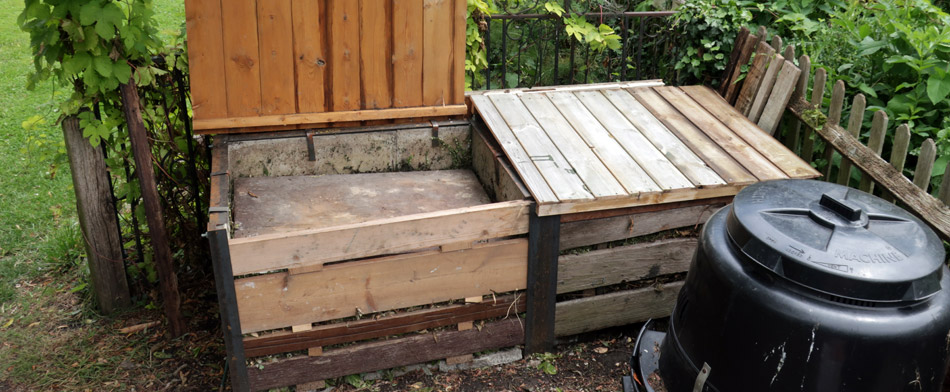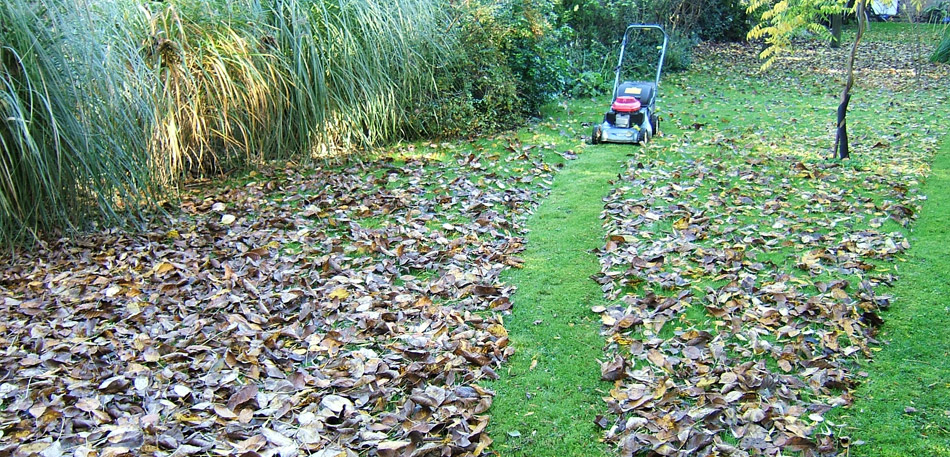Compost Making - Any Questions?
Making garden compost is the most immediate form of recycling, organic and with no energy use other than a bit of muscle power moving things about. It doesn't always happen like it should though.
Other composting pages: Compost maker bins | Making compost heaps | Composting

Q. My heap doesn't seem to get hot at all like it's supposed to.
A. The usual reason is that there's not enough material added at one go. There needs to be a reasonable amount of fresh material added to get the temperature rising.
If you are adding a lot of material at a time and it still isn't getting warm, the reason might be;
- Not enough nitrogen - too much brown material, not enough green.
- The heap is too dry.
- The material is in too large pieces and needs cutting up.
The heap will rot down much more quickly if it gets hot, but don't worry if it doesn't happen, it will still rot, just more slowly.
Q. I've heard that urinating on a compost heap helps, is this true, or is it a joke?
A. Urine contains nitrogen that will help feed the microbes and speed up their break-down of the brown carbon-rich material of which there is commonly too much. Also, the water content will help keep the heap moist. I regularly pee on my compost heaps when no-ones looking.
Q. I thought that it was worms that broke down the organic material into compost, what's all this about microbes?
A. Initially when a compost heap begins to rot, it is microbes, bacteria and fungi that feed on it and break it down. This can generate large amounts of heat, to the point where only microbes could even survive, larger decomposers such as worms would quite literally be cooked.
Later on after a few months, when the heating stage has subsided, larger decomposers such as earthworms, woodlice, and different kinds of fungi will begin to decompose the heap. It is during this stage that the matter in the heap becomes further processed, becomes less recognisable and becomes darker and more crumbly.
Q. What is better a traditional compost heap or a new style plastic compost bin?
If you don't have much space or produce much compost material, then a plastic bin is probably better. They are good at dealing with regular small amounts of material, retain some heat and keep the rain out. They do become full very quickly however if you have a lot of material to compost.
I use one for the initial hot-phase of compost making and would recommend them highly for this. Put new material in the bin and then let it rot down, and keep adding to the bin until full. Leave for another month after it' s full (if you can) and then turn upside down onto a more traditional heap, leaving for a further 6 to 8 months before using, and start again in the bin. You should be able to fill the bin with about 3 times its volume over a period of time which would then decrease to 1 times its volume before moving the semi-rotted material to the heap.
Q. More than anything else, my garden produces grass clippings, but these make the compost sticky and smelly, what is the answer?
A. This is a common problem. Grass clippings can help make very good compost but not on their own. Mix them if at all possible with other woody (brown) material. You could mix them autumn leaves if you have a pile of these somewhere rotting away slowly, this will be beneficial for both.
The worst thing you can do with grass clippings which sometimes happens is to put them in a black bin liner that is then tied tight so that no oxygen can enter, making the whole smelly horrible mess all the more unpleasant.
Alternatively, do you really need to always collect the clippings? In the summer when the grass is dry and fairly short, you could leave them on the lawn to dry out before collecting, or even buy a "mulching lawn mower".
Q. What is the best thing to with all the piles of autumn leaves that I sweep up from my garden.
A. One approach is to put them in a post and wire mesh container and let them rot down alone to make leaf mould which is an excellent conditioner, though takes at least a year before it's ready and realistically will be in the spring of the second year after the leaves are swept up in the first place. This requires a fair amount of space for long-term storage. You could save them until the following spring / summer and mix them with rich green material such as grass clippings.
One thing that will help speed things up would be to half-fill a large tub with (preferably dry) leaves and then cut them up using a strimmer. This helps break them down more quickly whatever you then do with them subsequently.
I have quite a largish area of lawn and not too many surrounding trees, so I raise the lawnmower a little over the normal height and use it to pick up fallen leaves. It chops them up and mixes them with lawn clippings all at the same time. The only disadvantage is that I have to empty the collection box an awful lot.

Q. I have collected a lot of leaves from the Autumn fall in my garden and have stored them with the intention of digging them in to the soil in the veg patch. Will the introduction of a lot of leaf compost over a long period (i.e. every year) alter the balance of the soil?
A. The short answer to your question is - yes. As the leaves rot down they will tend to become acidic, this will reduce with time and as the leaves continue to rot, they will become less acidic.
If you dig them into your veg patch every year, I would expect it to reach a certain level of acidity and then not get any greater, as you add more leaf mould, so another lot will rot and the acidity of that bit will reduce.
The overall effect won't be large however. If you have lots of leaves every year, it would be a real waste of valuable organic material not to use them. What I would do is add some lime to the compost heap when you gather them up in the autumn. This will help the pH of the leaf mould and also help the microbes to break the leaves down, they operate best in slightly alkaline conditions.
The lime will also help your compost heap when the leaves are dug in as most vegetables prefer alkaline to acidic conditions.
Q. We have a bin full of home made compost, can we use this in pots for patio plants?
A. Not really, garden compost is usually quite rough in texture due to the way it is made over a long time period, it's great as a mulch or for digging into planting holes elsewhere in the garden. As a bag of potting compost is a lot cheaper than the container plants you'll put in it, don't even risk it.
Q. Can I add newspapers to my compost heap?
A. Theoretically you can, though I really don't recommend it because I tried it once:
I finally got around to trying something I've been meaning to for ages, mixing grass clippings with shredded newspaper to make compost. This is an often repeated suggestion and I saw it on a gardening programme on the TV so it reminded me. The presenter had a nice clean tub of grass clippings and another of newspaper soaking in water, he took a few newspapers sheets and ripped them before dropping them onto the clippings, it took about 30 seconds and looked so easy.
I went down the garden with a few newspapers and a bucket of water. The newspapers went into the bucket to be soaked and I started to pull them out. Well - guess what happens to wet paper? it all sticks together, so getting one or two sheets thickness is really difficult, then you rip it and add it to the grass clippings. Now of course, your hands are wet and the clippings stick to your wet hands and get everywhere. After 10 minutes, I'd dealt with about a single newspaper and was rapidly advancing to a state of high dudgeon.
Conclusion - if you have the patience of a saint and all the time in the world, this method probably works. For normal mortals however, it's easier to add the grass as it comes and then mix it later using a fork when some non-grassy material arrives. The problem with newspapers is that they need to be added no more than one layer in thickness (of paper, i.e. a page - not a whole paper) if they are to rot quickly (less than a year) and that's a real pain to do in quantity. If there are several layers of paper, they manage to resist rotting far better than just about anything else. I suggest you don't bother and join me in pooh-poohing any further suggestions of doing this by people who quite clearly have never really tried it.
Copyright 2000 - present. All Rights Reserved | Privacy Policy Statement
